“There’s absolutely no reason to limit your consumption of eggs to three to four per week, as recommended by “heart-healthy” nutritional guidelines. In fact, consuming two to three eggs per day would provide a better boost to your health and protection against disease than a multivitamin supplement. Eggs truly are one of nature’s superfoods.”
~ Chris Kresser
Egg Yolks Are Awesome
After years of misinformation, it can be hard to wrap your mind around the fact that egg yolks are actually good for you. Do you remember egg white omelets? Are they still out there? So many crazy nutritional ideas become mainstream with no scientific foundation.
- Cholesterol: A review of the scientific literature shows that eating eggs has zero impact on the blood cholesterol in the vast majority of the population (70%). In the 30% that are affected, it raises both HDL (considered beneficial) and large particle LDL (which decreases particle density). Together this suggests egg consumption lowers heart disease risk, rather than increases it.
- Choline: It’s magical stuff and more concentrated in egg yolks than any other food. It supports vital detox pathways in the body, is necessary for the construction of every cell, and you can’t fire a nerve signal without it, which means you can’t move a muscle (including your heartbeat) without it. What’s scary is that most people are deficient in this essential vitamin. Eating egg yolks daily is the best way to ensure you’re not.
- Nature’s Supplement: The yolks are also rich in vitamins A, D, E and all of the B vitamins, as well as the following minerals: zinc, phosphorous, iron, calcium, iodine, potassium and selenium. And let’s not forget the antioxidants. Rich in lutein and zeaxanthin, egg yolks protect against cataracts and macular degeneration.
- The Elusive K2: Once upon a time, it was believed that all K vitamins provided one benefit: blood clotting. New research is showing that K1 (sourced from vegetables), is quite different from K2 (sourced from pastured egg yolks and dairy). K2 does far more: it protects against heart disease, promotes healthy skin, forms strong bones, optimizes brain function, and even protects against cancer. Note: only pastured eggs (not conventional) contain K2.
- The Pastured Egg Advantage: Mother Earth News did a study comparing the nutrient content of pastured eggs to conventional eggs. Results? Pastured eggs have twice the omega-3 fatty acids, 3 times more vitamin E, and 7 times more beta carotene. That omega 3:6 ratio is especially important, because the more omega 3 we consume (and the less omega 6), the less inflammation we have in our body. By contrast, conventional eggs have 19 times more of the inflammatory omega 6 acids. But there’s another reason to choose pastured eggs over conventional. There has never been a reported case of salmonella with pastured eggs, which means they’re much safer to eat raw. Why would you want to? For anyone with digestive problems, egg yolks are a nutrient godsend: “Raw egg yolk has been compared with human breast milk because it can be absorbed almost 100% without needing digestion.” (Dr. Natasha Campbell McBride, GAPS Diet, page 132).
- Why Are the Yolks So Nutrient-Dense? It’s nature’s design. If the egg was fertilized, the yolk would provide all the nutrition the embryo needs to develop into a chick. The white is simply there for protection – providing both a cushion and anti-microbial enzymes to protect against infection.
- What If I’m Allergic or Intolerant to Eggs? Usually, when people are intolerant to eggs, it’s to the whites. That’s why Dr. Sarah Ballantyne recommends egg yolks as one of the first reintroductions when coming off of the autoimmune protocol. They are nutrient-dense foods we should all eat, if we can. Here are two tips that sometimes help with successful reintroduction: (1) Choose eggs from pastured chickens that were never fed soy. (Soy proteins from the feed find their way into the eggs, so sometimes an egg intolerance is really a soy intolerance.) If you can’t find soy-free eggs locally, you can buy them online through Healthy Traditions. (2) After separating the yolk from the white, rinse the yolk to get 100% of the egg white off before eating. If the yolk still causes a negative reaction in your body, by all means, keep them out of your diet, and seek other nutrient dense foods instead, like seafood and organ meats.
Eleven Ways to Eat More Yolks
Have I convinced you that egg yolks are a superfood? Are you ready to make them part of your daily diet? Let’s count the ways:
- Stir them into a cup of bone broth or soup.
- Add them to a smoothie.
- Make homemade mayonnaise.
- Enjoy a yolkocado.
- Make salt-cured yolks.
- Next time you make cauliflower “rice”, add some egg yolks at the last minute for a “fried rice” flavor.
- Add them to your favorite meatball, meatloaf or hamburger recipe.
- Treat yourself to a delicious dessert, like blackberry brulee or olive oil ice cream.
- P.S. Eggnog can happen year-round.
How to Separate the Yolk from the White
My Mom was a baker, so I grew up separating egg yolks for her recipes. However, if you’ve never done this before, no worries. I filmed a little video to show you three easy ways to get at those luscious yolks. One extra tip: they’re easier to separate when the eggs are cold:
You May Also Be Interested In
Credit: image at top of page from Joăo Estęvăo A. de Freitas via Wikimedia.

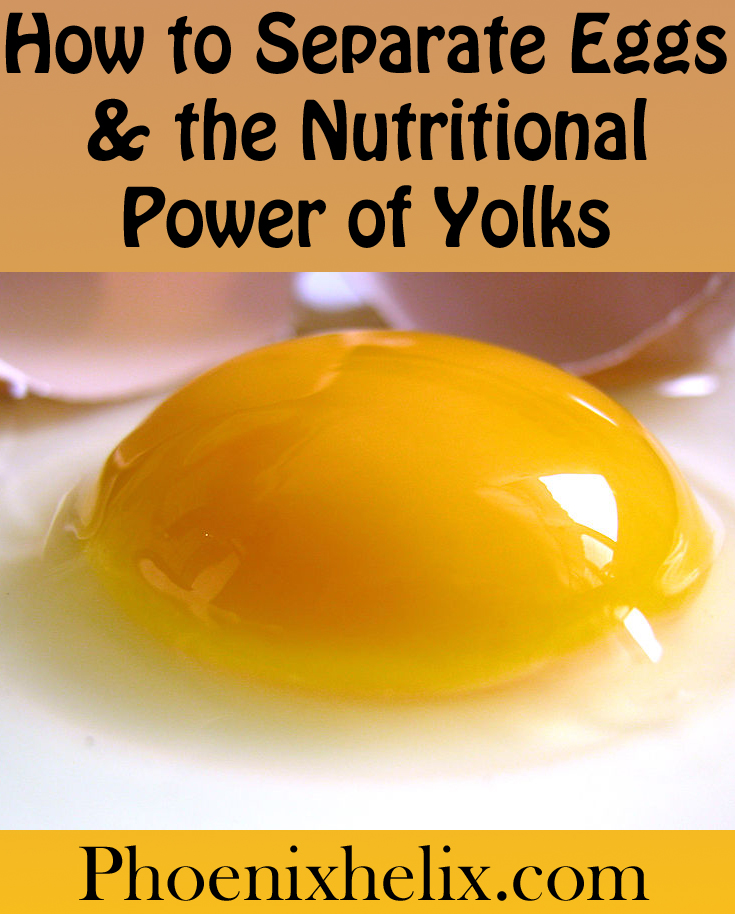
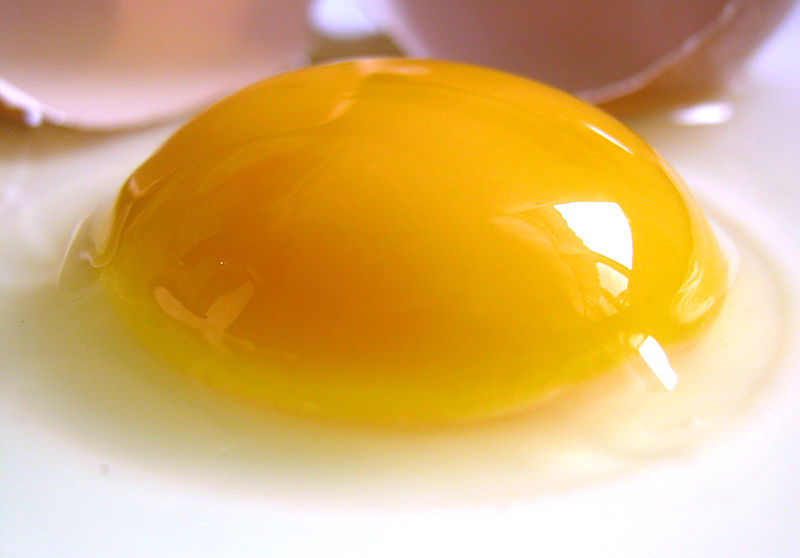
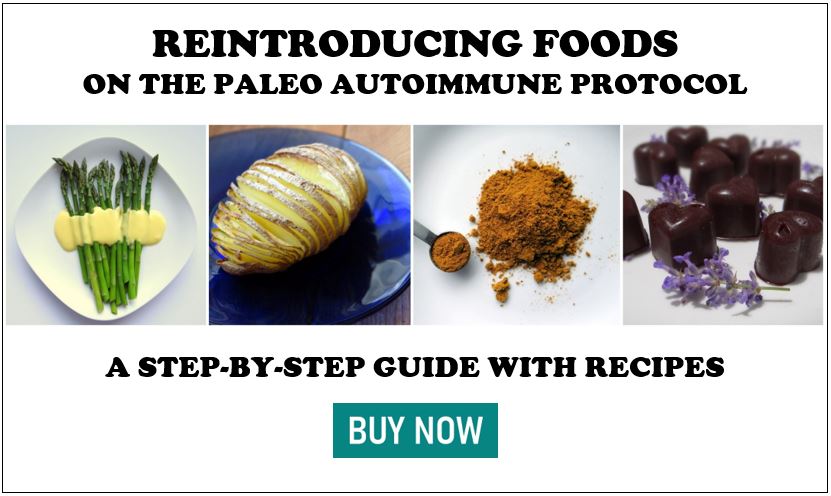
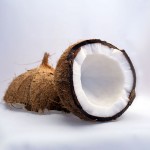

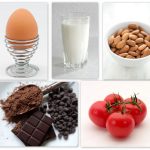
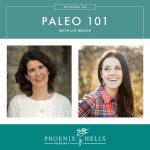
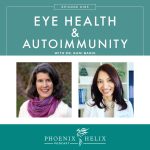


I am AIP and have been leaving eggs out as a re-introduction because I keep needing iron infusions and was told that eggs inhibit iron absorption. I thought I might give them a try down the track in between meals though. Thoughts?
Hi Susan. I think that’s a good question for your doctor, because anemia has many different root causes. Depending on what yours is, their advice may vary. They may say eggs are a definite no-no, or they might say a few eggs per week are fine.
Hello,
I was wondering, is it okay to hard boil eggs whole and then eat just the hard boiled yoke as a reintroduction?
Thank you,
Claire
Hi Claire. That’s a fine option.
Should we supplement Choline while we are off eggs? I already supplement B vitamins, zinc and K2. I have Hashi’s and CFS, fatigue is my biggest physical problem but I really worry about my ability to detox as my metabolism is nil.
The recommendation is to get our nutrition through food as much as possible. Liver is an excellent source of choline and all the B vitamins. It truly is one of nature’s superfoods. Chicken liver is milder in flavor and a good one to start with, if you’re not accustomed to organ meats. I have a good recipe: Chicken Liver Fried “Rice.” Mickey from Autoimmune Paleo has an excellent recipe for beef liver that is the only way I like it: Beef Liver Pate.
Are ‘Free range’ eggs the same as ‘Pastured’ eggs?
Not exactly. Here’s a good article explaining the difference: http://livinghomegrown.com/2012/06/decoding-the-terms-cage-free-free-range-pasture-raised-eggs.html
I just want to thank you for this blog post. I was extremely skeptical about both the possibility of rinsing off all of the egg white and that it would actually make any difference to my reaction, but I decided to give it a try. Per your suggestion, I added the yolk to some bone broth. I wasn’t surprised that it tasted great or that it left me feeling nourished and energized. What did surprise me, however, was that I didn’t wake up the next morning with a bad reaction: no congestion, no itchy eyes, no puffy eyelids, and no nasty earache. Thank you, Phoenix Helix! What a blessing!
Yay! Thanks so much for sharing.
Thanks for the great article. I want to add egg yolks so much but I am fearful to. I think I have an autoimmune disease but no one can pin point anything. I have been following Paleo for a year and about half of that AIP. I have had some improvement with some of my symptoms but I have added new ones with more still comimg. Sigh! I am afraid that eggs might push me over the edge…heck I am getting afraid to eat anything but meat and veggies. Do eggs cause autoimmunity?
Hi Tina. I have autoimmune disease, and I was able to reintroduce eggs successfully. I put an egg yolk in my breakfast soup every morning. Fear of food is a natural side effect of food intolerance and autoimmunity, but it’s really important we push through that fear and try to widen our diet. If you have been on the AIP for 6 months, I recommend starting reintroducing some foods. Egg yolks and ghee would be excellent first choices, because they are both so nutrient-dense. Neither one causes autoimmunity. I have an e-book that will safely guide you through the process. Healing autoimmunity is as much about nutrition as anything else, and if we eat a diet that’s too restricted for too long, our cells won’t get the nutrients they need to heal.
I got your e-book and I loved the step by step details. That is exactly what I needed.
I just read that new symptoms like the pain and numbness might be from the nerves healing and that this will ease up. Have you heard of such a thing?
Hi Tina. It depends on the person and the diagnosis. For some, that might be a sign of healing. For others, it’s a sign of a problem. Honestly, for me, I expect to feel better, and I’m suspicious of any “no pain no gain” theories. In my personal experience, pain was never a sign of healing. But a functional medicine specialist who knows your case would be the one to ask.
Hi Eileen,
This post was very important for me to read. I was raised with the “no more than 3 egg per week” rule. I see how this could apply to those who are eating conventionally grown eggs and who have intolerances. But I am lucky to have a fridge full of soy free pastured eggs from Tropical Traditions! And we do plan on getting two chickens soon. I just can’t eat eggs raised on soy. I started to panic about eating eggs knowing all that soy was going into my body. Anyway, this post really hit home with me as someone who used to be scares of eating too many eggs. Thank you again my sweet friend for you informative posts!! They are always such a pleasure to read.
Hugs,
–Amber
Thanks, Amber! I imagine there’s nothing better than chickens from your own back yard, and your kids are going to have a blast.
I struggled with an egg allergy for years before finally figuring out that it was only *conventional* eggs that gave me problems. If only people ate real food we would have so many less intolerances – I’m convinced! Thank you so much for sharing this at Savoring Saturdays!
What an informative article about eggs! We LOVE eggs in our household. I’d love for you to link up to Savoring Saturdays!
http://www.wholefoodmomonabudget.com/2014/03/savoring-saturdays-5.html
Thanks for the invite, Eva. I’ll be happy to.
By coincidence, this morning I decided to test eggs again after learning that I had salicylate sensitivity, then I saw your article. I boiled two eggs and put some ghee on them. Previously, I thought that I reacted to eggs, but now I think that it may be what I ate with eggs. For instance, I used to fry them in olive oil, which is very high in salicylates. It’s possible that I was reacting to olive oil and not to eggs. Depending how I feel today, I may try separating the yolk as you explained in the video. Thanks, for this post.
I’m looking forward to reintroducing egg yolks, it’s one of the foods I truly miss. Thank you for the infotmative article. Your knowledge and support inspire me on my healung journey with RA, wanting to stay the course without the scary pharmaceuticals.
Thanks, Kim. We’re all in this together, and I’m continually inspired by all of you.
Thanks for the great article on eggs. Makes cleaning that chicken coop each week while worth the extra effort for those fresh pastured eggs!
Totally worth it! Since you have chickens, have you seen this video? It makes me laugh every time. It’s called “The Hazards of Backyard Hens”: http://www.youtube.com/watch?v=Ll187f27Pxg
That video is awesome!!!
Could you make scrambled eggs or omelette a with just the yoke?
Absolutely, but I will say that when I tried that, I didn’t love the texture.
Thanks for the respons. Do you think there is anyway to replicate the texture? Maybe adding coconut milk?
Do some experiments and let me know!
Informative article. I’ve been thinking about reintroducing egg yolks, but I was wondering about the white residue. Now I know I can just rinse the yolk in water! Thanks.
I think it would be good to indicate in your title and headings that it’s pastured egg yolks that probably have health benefits. The vast majority of people in developed countries eat eggs from CAFO’s which may indeed be harmful if eaten in large quanitities, given the much higher quanitites of omega 6 fatty acids.
Good morning Eileen!
Thanks for all your good information.
I think I can handle egg yolks! I don’t want to get my hopes up just yet though. 😉 But what to do with all those egg whites that don’t sit well with me?
You know, I just throw mine away, which would have bothered me in the past, due to the food waste, but now that I know all the nutrition is in the yolks, I don’t mind at all. However, one creative use of them is salt roasting. Have you heard of it? Here’s an article that shows the method: http://www.bonappetit.com/test-kitchen/cooking-tips/article/salt-roasting
Do you have a dog? That’s where mine go…